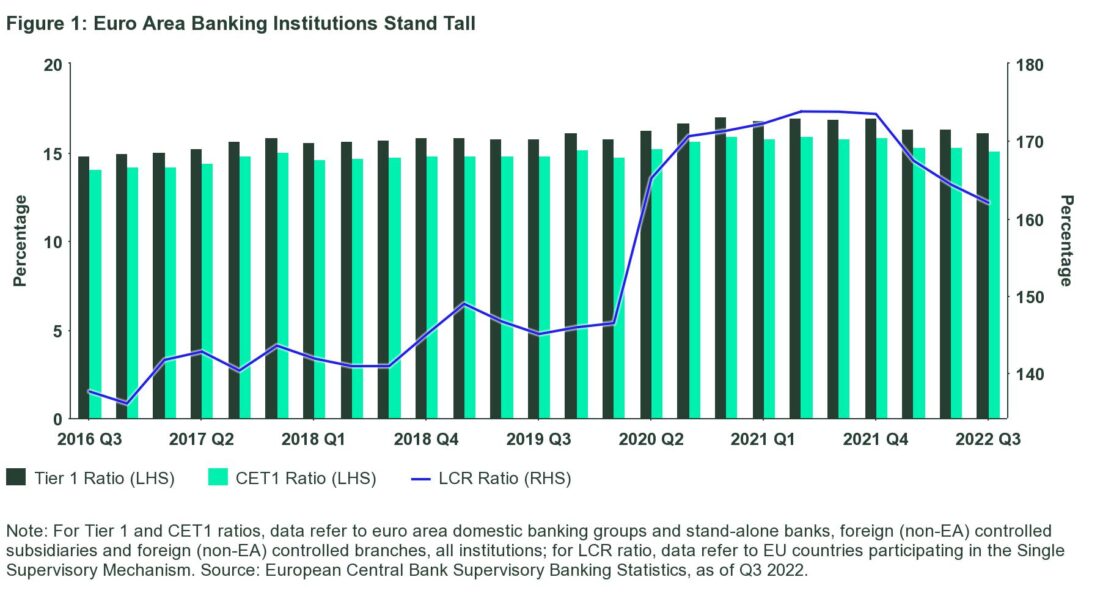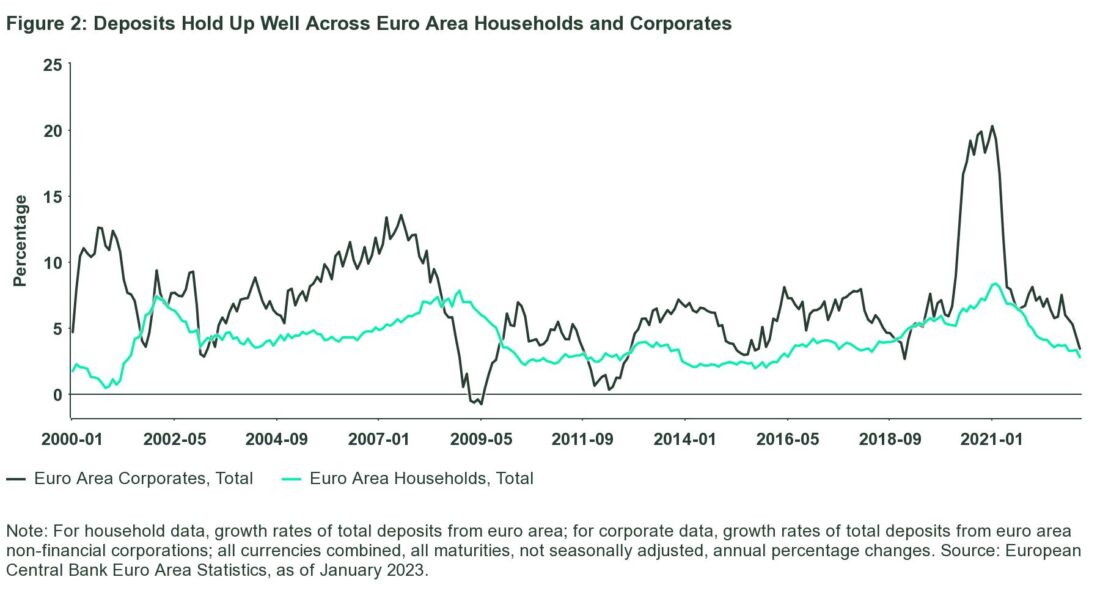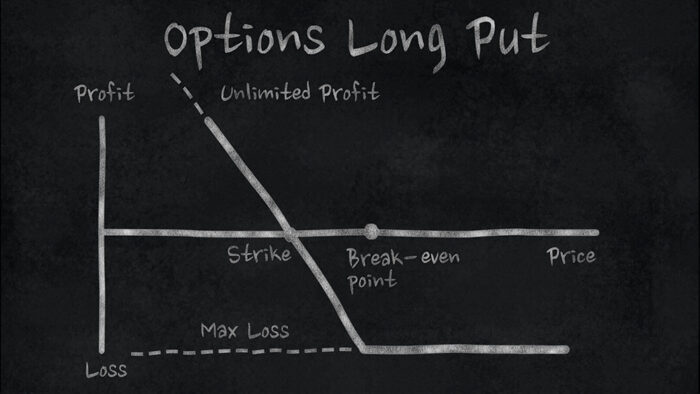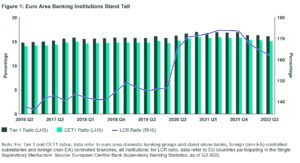Credit Suisse has become the latest casualty of a crisis in confidence in the banking sector, resulting in the bank being forced to merge with UBS. The bank’s demise has spooked the markets, but the event was more likely idiosyncratic in nature with no lasting implications for the larger European banking sector.
Credit Suisse has been the weakest link in the European banking system for over two years now, which led the bank to face a crisis in confidence on the back of market volatility in March. A deal with UBS was struck on the back of the intervention of the Swiss Financial Market Supervisory Authority (FINMA) and the Swiss National Bank. This was an important positive step as it prevented systemic contagion driven by counter party risk.
Credit Suisse’s fallout was the result of idiosyncratic risk and overall has limited long-term impact on the European financial sector. Even so, any such event can shake up confidence which necessitated a major circuit break. Under the circumstances, the UBS/Credit Suisse deal was the best option available for the regulators.
The Case of AT1 Bonds
For the deal to be palatable to UBS, a number of guarantees were given, which included the write-off of US$17 billion worth of additional tier 1 bonds (AT1) issued by Credit Suisse. While AT1 bonds were fully written off, FINMA did not fully penalize equity investors, upsetting the conventional waterfall mechanism of privileging bond holders over equity investors.
This situation has created some tension in the funding markets, but both the European Central Bank (ECB) and UK regulators have issued statements to support the AT1 market and help ease fears. Andrea Enria, Chair of the Supervisory Board of the ECB, gave a speech to the European Parliament on March 21, emphasizing the point that the “hierarchy of claims is clearly defined in our resolution framework, and common equity tier 1 (CET1) capital would always be first to absorb losses and would be fully written down before AT1 instruments could be written down.”
But inevitably scars have been made and a step up in AT1 costs could evolve as investors re-price the risks associated with this asset class. Nonetheless, as we look back at the sources of volatility over the past two weeks in the financial sector, those associated with Credit Suisse have now been contained. In addition, the strong balance sheets of euro area banks have been a source of resilience and would be a crucial driver of how they navigate the current events (Figure 1).

Europe’s Regulatory Environment Robust
The Silicon Valley Bank fallout is also not directly relevant to Europe, where interest rate risk is not an issue for banks. Besides, as of last reported financials, even if all available for sale and held-to-maturity unrealized securities losses of European banks went through their capital, the average hit would be less than 5%.
This is primarily due to the different regulatory environment in Europe where supervisors have enforced Basel rules on interest rate risk in the banking book (IRRBB) and have been proactive in monitoring this risk. Mr. Enria underscored this point in his speech to the European Parliament when he stated, “there is no direct read-across of the US events to euro area significant banks.”
Mr. Enria pointed to the fact that all banks are subject to liquidity coverage (LCR) and net stable funding ratio requirements. The LCR ratio is on average well above 160% for euro area banks and has declined only modestly since the start of monetary policy normalization (Figure 1).
A key point made was that “more than half of the existing buffers of highly liquid assets are made up of cash and central bank reserves, which sensibly mitigates the risk of mark-to-market losses when liquidity needs arise.” Overall, corporate deposits and household deposits are also holding up well in the euro area (Figure 2).


Click here to read the full article
—
Originally Posted March 27, 2023 – Taking Stock of the European Banking Sector
Disclosure
Marketing Communication
State Street Global Advisors Worldwide Entities
The whole or any part of this work may not be reproduced, copied or transmitted or any of its contents disclosed to third parties without State Street Global Advisors’ express written consent.
The views expressed in this material are the views of Viki Farmaki through the period ended 27 March 2023 and are subject to change based on market and other conditions.
This document contains certain statements that may be deemed forward looking statements. Please note that any such statements are not guarantees of any future performance and actual results or developments may differ materially from those projected.
The information provided does not constitute investment advice and it should not be relied on as such. It should not be considered a solicitation to buy or an offer to sell a security. It does not take into account any investor’s particular investment objectives, strategies, tax status or investment horizon. You should consult your tax and financial advisor.
All information is from State Street Global Advisors unless otherwise noted and has been obtained from sources believed to be reliable, but its accuracy is not guaranteed. There is no representation or warranty as to the current accuracy, reliability or completeness of, nor liability for, decisions based on such information and it should not be relied on as such.
Past performance is not a reliable indicator of future performance.
Investing involves risk including the risk of loss of principal.
The trademarks and service marks referenced herein are the property of their respective owners. Third party data providers make no warranties or representations of any kind relating to the accuracy, completeness or timeliness of the data and have no liability for damages of any kind relating to the use of such data.
For EMEA Distribution: The information contained in this communication is not a research recommendation or ‘investment research’ and is classified as a ‘Marketing Communication’ in accordance with the Markets in Financial Instruments Directive (2014/65/EU) or applicable Swiss regulation. This means that this marketing communication (a) has not been prepared in accordance with legal requirements designed to promote the independence of investment research (b) is not subject to any prohibition on dealing ahead of the dissemination of investment research.
© 2023 State Street Corporation – All rights reserved.
Tracking Code: 5590310.1.1.GBL.RTL
Expiration Date: 31/03/2024
Disclosure: State Street Global Advisors
Do not reproduce or reprint without the written permission of SSGA.
All information has been obtained from sources believed to be reliable, but its accuracy is not guaranteed. There is no representation or warranty as to the current accuracy, reliability or completeness of, nor liability for, decisions based on such information and it should not be relied on as such.
State Street Global Advisors and its affiliates (“SSGA”) have not taken into consideration the circumstances of any particular investor in producing this material and are not making an investment recommendation or acting in fiduciary capacity in connection with the provision of the information contained herein.
ETFs trade like stocks, are subject to investment risk, fluctuate in market value and may trade at prices above or below the ETF’s net asset value. Brokerage commissions and ETF expenses will reduce returns.
Bonds generally present less short-term risk and volatility than stocks, but contain interest rate risk (as interest rates raise, bond prices usually fall); issuer default risk; issuer credit risk; liquidity risk; and inflation risk. These effects are usually pronounced for longer-term securities. Any fixed income security sold or redeemed prior to maturity may be subject to a substantial gain or loss.
Investing involves risk including the risk of loss of principal.
The whole or any part of this work may not be reproduced, copied or transmitted or any of its contents disclosed to third parties without SSGA’s express written consent.
Investing in high yield fixed income securities, otherwise known as “junk bonds”, is considered speculative and involves greater risk of loss of principal and interest than investing in investment grade fixed income securities. These Lower-quality debt securities involve greater risk of default or price changes due to potential changes in the credit quality of the issuer.
COPYRIGHT AND OTHER RIGHTS
Other third party content is the intellectual property of the respective third party and all rights are reserved to them. All rights reserved. No organization or individual is permitted to reproduce, distribute or otherwise use the statistics and information in this report without the written agreement of the copyright owners.
Definition:
Arbitrage: the simultaneous buying and selling of securities, currency, or commodities in different markets or in derivative forms in order to take advantage of differing prices for the same asset.
Fund Objectives:
SPY: The investment seeks to provide investment results that, before expenses, correspond generally to the price and yield performance of the S&P 500® Index. The Trust seeks to achieve its investment objective by holding a portfolio of the common stocks that are included in the index (the “Portfolio”), with the weight of each stock in the Portfolio substantially corresponding to the weight of such stock in the index.
VOO: The investment seeks to track the performance of a benchmark index that measures the investment return of large-capitalization stocks. The fund employs an indexing investment approach designed to track the performance of the Standard & Poor’s 500 Index, a widely recognized benchmark of U.S. stock market performance that is dominated by the stocks of large U.S. companies. The advisor attempts to replicate the target index by investing all, or substantially all, of its assets in the stocks that make up the index, holding each stock in approximately the same proportion as its weighting in the index.
IVV: The investment seeks to track the investment results of the S&P 500 (the “underlying index”), which measures the performance of the large-capitalization sector of the U.S. equity market. The fund generally invests at least 90% of its assets in securities of the underlying index and in depositary receipts representing securities of the underlying index. It may invest the remainder of its assets in certain futures, options and swap contracts, cash and cash equivalents, as well as in securities not included in the underlying index, but which the advisor believes will help the fund track the underlying index.
The funds presented herein have different investment objectives, costs and expenses. Each fund is managed by a different investment firm, and the performance of each fund will necessarily depend on the ability of their respective managers to select portfolio investments. These differences, among others, may result in significant disparity in the funds’ portfolio assets and performance. For further information on the funds, please review their respective prospectuses.
Entity Disclosures:
The trademarks and service marks referenced herein are the property of their respective owners. Third party data providers make no warranties or representations of any kind relating to the accuracy, completeness or timeliness of the data and have no liability for damages of any kind relating to the use of such data.
SSGA Funds Management, Inc. serves as the investment advisor to the SPDR ETFs that are registered with the United States Securities and Exchange Commission under the Investment Company Act of 1940. SSGA Funds Management, Inc. is an affiliate of State Street Global Advisors Limited.
Intellectual Property Disclosures:
Standard & Poor’s®, S&P® and SPDR® are registered trademarks of Standard & Poor’s® Financial Services LLC (S&P); Dow Jones is a registered trademark of Dow Jones Trademark Holdings LLC (Dow Jones); and these trademarks have been licensed for use by S&P Dow Jones Indices LLC (SPDJI) and sublicensed for certain purposes by State Street Corporation. State Street Corporation’s financial products are not sponsored, endorsed, sold or promoted by SPDJI, Dow Jones, S&P, their respective affiliates and third party licensors and none of such parties make any representation regarding the advisability of investing in such product(s) nor do they have any liability in relation thereto, including for any errors, omissions, or interruptions of any index.
BLOOMBERG®, a trademark and service mark of Bloomberg Finance, L.P. and its affiliates, and BARCLAYS®, a trademark and service mark of Barclays Bank Plc., have each been licensed for use in connection with the listing and trading of the SPDR Bloomberg Barclays ETFs.
Distributor: State Street Global Advisors Funds Distributors, LLC, member FINRA, SIPC, an indirect wholly owned subsidiary of State Street Corporation. References to State Street may include State Street Corporation and its affiliates. Certain State Street affiliates provide services and receive fees from the SPDR ETFs.
ALPS Distributors, Inc., member FINRA, is distributor for SPDR® S&P 500®, SPDR® S&P MidCap 400® and SPDR® Dow Jones Industrial Average, all unit investment trusts. ALPS Distributors, Inc. is not affiliated with State Street Global Advisors Funds Distributors, LLC.
Before investing, consider the funds’ investment objectives, risks, charges, and expenses. For SPDR funds, you may obtain a prospectus or summary prospectus containing this and other information by calling 1‐866‐787‐2257 or visiting www.spdrs.com. Please read the prospectus carefully before investing.
Disclosure: Interactive Brokers
Information posted on IBKR Campus that is provided by third-parties does NOT constitute a recommendation that you should contract for the services of that third party. Third-party participants who contribute to IBKR Campus are independent of Interactive Brokers and Interactive Brokers does not make any representations or warranties concerning the services offered, their past or future performance, or the accuracy of the information provided by the third party. Past performance is no guarantee of future results.
This material is from State Street Global Advisors and is being posted with its permission. The views expressed in this material are solely those of the author and/or State Street Global Advisors and Interactive Brokers is not endorsing or recommending any investment or trading discussed in the material. This material is not and should not be construed as an offer to buy or sell any security. It should not be construed as research or investment advice or a recommendation to buy, sell or hold any security or commodity. This material does not and is not intended to take into account the particular financial conditions, investment objectives or requirements of individual customers. Before acting on this material, you should consider whether it is suitable for your particular circumstances and, as necessary, seek professional advice.





















